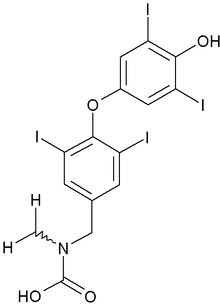VANCOUVER, B.C. -- Bioavailability of even the newer rapid-release formulation of levothyroxine known as Levoxyl is reduced 40% by taking the tablets close to a meal. Michael J. Lamson, Ph.D., said at the annual meeting of the American Thyroid Association.
The hope had been that Levoxyl's rapid release might permit a new flexibility in dosing, allowing patients to take the drug in proximity to meals instead of on an empty stomach, as has traditionally been recommended for L-T4 therapy. But that didn't prove to be the case in the first large study to assess the effects of a meal on oral absorption of L-T4 using the Food and Drug Administration's formal bioequivalence methodology, explained Dr. Lamson of King Pharmaceuticals.
He reported on 48 healthy participants in a randomized, three-way crossover trial. They took two 300-mcg tablets of Levoxyl on three occasions, each separated by a 35-day washout. One dose was taken under fasting conditions. The second dose was taken 10 minutes before consuming what is known in the world of pharmacokinetics research as a "standard FDA breakfast"--a 950-kcal, 58% fat meal consisting of eggs, bacon, hash browns, toast, and milk. The third dose was taken immediately after consuming such a breakfast.
Bioavailability of L-T4 was reduced by 40% regardless of whether subjects took the drug shortly before or immediately after the meal. This is a clinically significant finding, because it is well established that even small changes in L-T4 bioavailability can have a profound impact upon the success of oral replacement therapy.
In clinical terms, this means that taking rapid-release L-T4 in proximity to a meal or a medication known to interfere with L-T4 renders a 100-mcg dose of Levoxyl equivalent to a 60-mcg dose. Dr. Lamson said.
COPYRIGHT 2004 International Medical News Group
COPYRIGHT 2005 Gale Group



